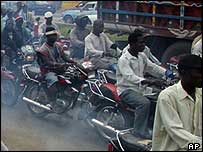


Posted by BBC News on



Nigeria's two biggest labour unions have agreed to fight the 30% increase in fuel in defiance of a new law banning unilateral strike action.
Nigeria's two biggest labour unions have agreed to fight the 30% increase in fuel in defiance of a new law banning unilateral strike action.
Last year the Nigerian Labour Congress (NLC) called three crippling general strikes against fuel prices rises.
The NLC and the Trade Union Congress (TUC) said they are meeting to decide when to strike and will not back down until the prices are reversed.
But the president said the subsidies on imported fuel could not be maintained.
Poverty eradication
President Olusegun Obasanjo said on Saturday that the government had financed more than $1bn in fuel subsidies in the past six month as a result of high prices of refined petrol on the international markets.
Money raised from the price increase, which too effect last weekend, would be used to develop other sectors of the economy to promote poverty eradication, he said.
Nigeria is sub-Saharan Africa's largest producer of crude oil, but is then forced to buy back petrol, diesel and other refined fuels from non-oil-producing countries at a far higher price.
Two-thirds of Nigeria's population is still living on less than $1 a day, and the unions say the fuel price increases will badly affect all Nigerian workers.
The NLC is the umbrella organisation representing unions for junior employees, and the TUC represents senior employees' unions.
Under legislation passed in March, these umbrella unions are not allowed to call a strike, and each individual union must ballot its members before embarking on industrial action, our correspondent Sola Odunfa says.
The NLC is meeting on Wednesday to decide when to strike.

